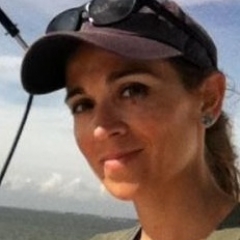
Maria Tzortziou
Remote Sensing, Biodiversity, Ecology, Atmospheric Dynamics
Dr. Tzortziou's research integrates multidisciplinary datasets, satellite remote sensing observations, and ecosystem models to provide mechanistic insights into the impacts of human and environmental pressures on biogeochemical cycles and ecological processes along the continuum of terrestrial, wetland, estuarine, and open ocean ecosystems. Her research has taken her from the Gulf of Mexico and the Chesapeake Bay wetlands to the Yukon River delta in Alaska and the Arctic coastal ocean, from urbanized coastlines in the Mediterranean and Europe's trans-boundary watersheds to the Asian coastal megacities of Seoul and Busan, to the Hindu-Kush Himalayan river basins.
Dr. Tzortziou is on the Science Steering Committee for the Ocean Carbon Biogeochemistry Program and on the Science Leadership Board of the North American Carbon Program. She has served on the Steering Committee and Writing Team for the 2017-2027 NASA Ocean Biology & Biogeochemistry Program Advanced Science Plan and she was Invited Chapter Author for the Second State of the Carbon Cycle Report (SOCCR-2). Tzortziou is the Deputy Program Applications Lead for NASA's upcoming satellite mission PACE (Plankton, Aerosol, Cloud, ocean Ecosystem), she has served on the science teams for numerous joint airborne-ship field expeditions, and she has been Science Team Member for NASA's PACE Science Team (2014-2018) and NASA's Earth Venture Instrument (EVI) Mission GLIMR (Geostationary Littoral Imaging and Monitoring Radiometer) (2019-now).
